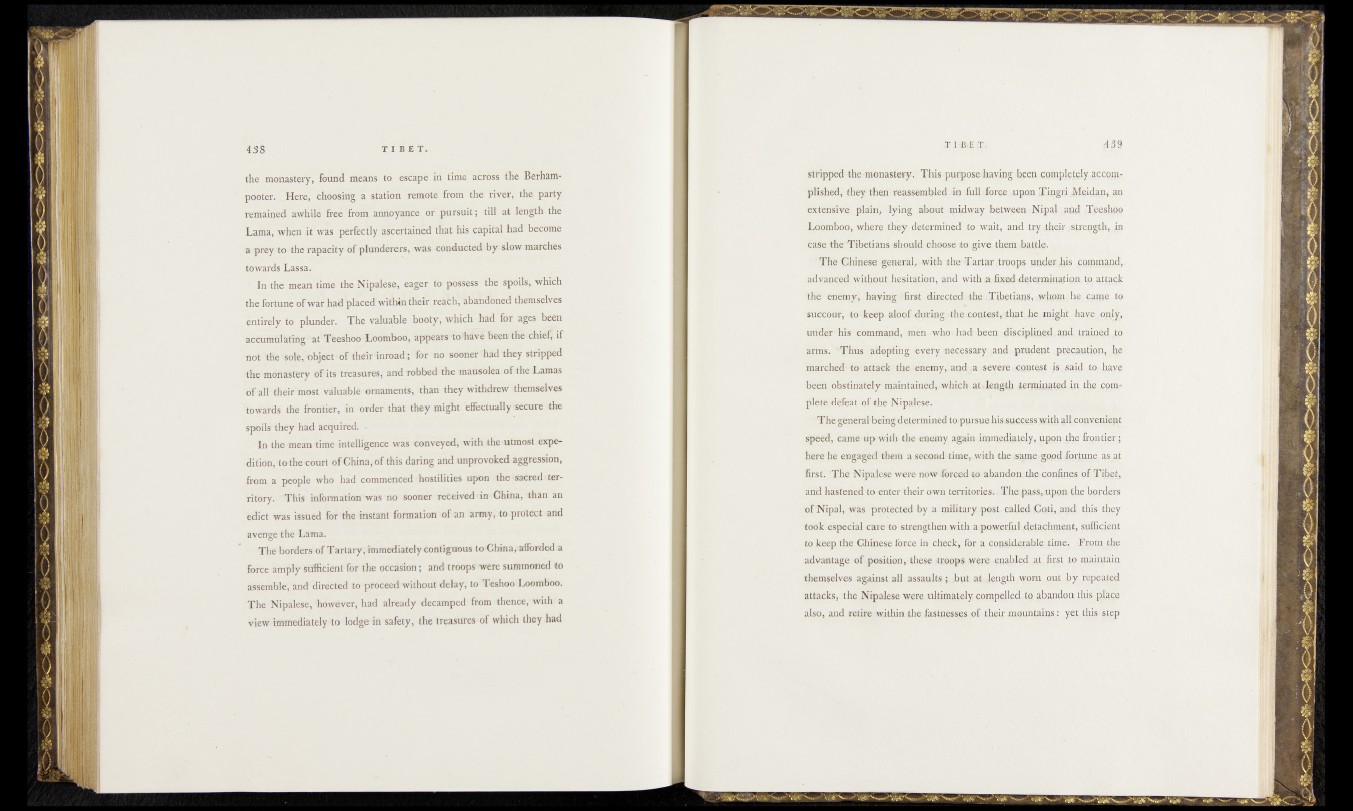
438 TIBET.
the monastery, found means to escape in time across the Berham-
pooter. Here, choosing a station remote from the fiver, the- party
remained awhile free from annoyance or pursuit; til at length the
Lama, when-it was perfectly ascertained that his capital had become
a prey to the rapacity of plunderers, was conducted by slow marches
towards Lassa.
In the mean time the Nipalese, eager to possess the spoils, which
the fortune of war had placed within their' rea^h,‘abandoned themselves
entirely to plunder. The valuable booty, which had for ages been
accumtalhfing at Teeshoo Loomboo, appears to »have been the chief} if
not the sole, Object ■ of «heir Inroad ;: for no sooner hid they stripped
the monastery of its treasures, and robbed the mausoJea:ofthe Lamas
of all their most valuable ornaments, than they withdrew themselves
towards the frontier, in order that they might effectually'secure the
spoils they had acquired. .
In the-mean time intelligence was conveyed, with the‘utmost expedition,
to the court of China, of this daring and unprovoked aggression,
from a people who had commenced hostilities upbn then Sac red‘territory.
'This information Was no sooner 'received'in China,‘thin an
edict was issued for the instant formation-of-an anayy.to protect and
ivenge fbe Lima.
The borders of Tartary, immediately contiguous to China,'afiorded a
force amply sufficient for the occasion; and troops' were summoned to
assemble, and directed to proceed without delay,' to Teshoo Loomboo.
'The Nipalese, 'however, had already decamped from thence,1 with: a
view irmnediately to lodge in safety, the treasures of which they had
st-ripped-lhe-m-enastery.' TMsypiiEposed^y'jjig <been:$Qi^pl|)Je^y^9cp|n-
plished,- fhey- then-reassembled ifiall i&reeupon Tingri Meidan, an
extensive pMn> -lying about midway between Nipal aud- .Tee^-hoo
Loomboo, wjiere, they d^ernjjnedl^toijWait’, ?and ,sf$eagt{i> jin
case, theTlbetians'ShouiJd- choose to .give, themihattle.
I The Chinese-general, ^with tlae'vrarJar.jti‘OQ,ps
advanced without hesitation, and with a fixed determination to attack
the enemy; haying-first directed . ithe* oTj JRj l f f f i j hej&upe to
suecduf^to'feep tjooLA«mgariib-.«>iateg<vithat.
under1 his command,-men -who1 -had been, iidi&cipfeejd and trained to
arms. "Thus adopting, every mejE§#a«y;jaBdispBtdQPt
mirched- to -attack- the -enemy, and .a .severe - is ,^ d ;(to^fey^'
•been -obstinately-maintaiaedriwhkk.attfong|b terminated in, t^e jCgjn^
plete -de'feat of the Nipalese.
The-general‘bei«g;deternaned tapprau.efiisiSjiflC,eSs allflqpvenii^t
speed, came up witb the enemy again .kamediafely, pgpngjie b g g to j
here he engaged-them a second time,-with fiheiS^niefggod Jprtjine, ^s?i^jt
first. 'The ‘Nipalese were now forced to‘’Shand.on>the.,QonfineS: of; Tii?,efc,
and hastened to enter their o-wn territories. offh,e>pass. .upamthe borders
of'Nipal, was ■ protected by a military post, tailed jCati> apd they
took especial care to strengthen-with a pQwerjpl%4&Mcfrm§nt, sqfljicxent
to keep the Chinese force in check, for a considerable time. -F;jQrai||te■.
advantage of position,-these tx«opsltwea'el.enal^e54t,at fiptfiQ ipain^ain
themselves against all assaults ; ,,J>yt -at) length .-^pmJ,;g^^jibyjr.epe^eH
attacks, the Nipalese were ultimately; poxqpfll^d..t9 |j$n4on. this .ojjice
also, and retire within the ;fastn®ssps of ylt^r mqpntains: ^^tljis step